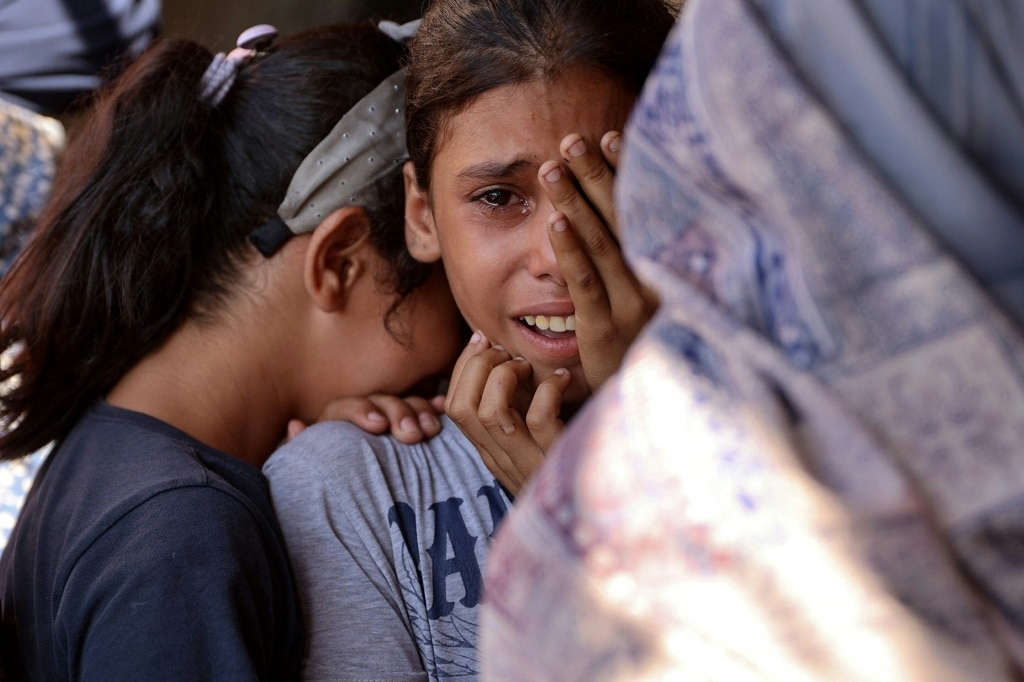UNICEF’s James Elder confronted by the cries of children in Gaza
He has been to countless warfronts, but it’s the cries and screams of children in pain that have gotten to UNICEF spokesman James Elder.
World
Don't miss out on the headlines from World. Followed categories will be added to My News.
A couple of weeks ago in Gaza I met a 13-year-old boy. Determined as teenagers are, he had left his family where they were sheltering and gone in search of bread.
Food is incredibly scarce in Gaza, and, when available, prohibitively expensive. Mothers often tell me they are not eating for a couple of days so that there will be enough bread or watery
pasta to feed their children, just one meal, for another day.
When I met this boy, Abed Al Rahman, he was in a crowded Gaza hospital, his thin body filled with shrapnel. He went looking for promised food aid, but instead found chaos. He had seen people rushing toward a distribution site set up by the Gaza Humanitarian Foundation (GHF). A trickle of food after 11 weeks of nothing. He rushed with the crowd. There was an explosion, a shell fired from a tank, and Abed Al Rahman was terribly wounded.


In barely a month of operation, hundreds of people have been reportedly killed and thousands wounded around these GHF sites. Just days ago scores more were reported killed as people
were again forced toward a militarised zone to avoid starvation.
Indeed, politicised aid distribution creates unsafe conditions for everyone, with the GHF having itself lost local team members and volunteers to deadly violence.
This isn’t about whether aid can be delivered safely — it already is. UNICEF does it every day. The differences are clear: one approach protects civilians, the other puts them in a potential line of fire.
Grief knows no nationality. Palestinian families worry for their children no differently than families anywhere else. In the hospital, Abed Al Rahman’s father wept silently, listening to his son relive the moment he tried to find food, but came back broken. His brother supported Abed Al Rahman’s small fragile body as we spoke. His distraught mother worked relentlessly to get her son a medical evacuation.


Across Gaza I have visited scores of children with terrible injuries of war, burns, amputated
limbs, and things I will never unsee in Gaza. I have smelt the decay of bodies … but on this
mission, with the critical lack of medicines and pain relief, it is the cries and screams of children in pain that hit hardest. That’s the last image I have of Abed Al Rahman: a brave little boy, trying to smile through the agony, until a scream broke free on its own.
On the day I left Gaza I got word that Abed Al Rahman had died of his injuries. A senseless
death driven by a dangerous attempt to sideline humanitarian organisations from doing the work they have done in warzones for decades, across the globe.
In the hospital room next to Abed Al Rahman’s, I met a girl named Sela. Both her legs had been amputated at the hip. Traumatised, Sela whispered something – then stared at the ceiling in silence.
In the bed next to Sela, I met Jana, 11-years-old. She was brushing her teeth one morning when the school she was sheltering in was hit by an air strike. Shrapnel hit her back and she was paralysed. As she lay unable to move, she watched her friend die nearby. Just days later I found Jana in a coma.


Down the corridor was little Obeida, 10. The area he was staying in had received an evacuation notice (more than 80 per cent of Gaza is under displacement orders), so in the middle of the night his family hurriedly fled.
Obeida was carrying his mattress when he was struck by shrapnel from tank fire. I met his parents, fraught with worry because they were unable to get a medical evacuation for their son.
Thousands of children in Gaza – yes, thousands – need medical evacuation from Gaza. However, there is a lethally low number of countries willing to accept children for treatment. It is the cruellest treatment of children who have survived an attack on their home, tent, or shelter, then admitted to hospital, where so much of the treatment and pain relief is unavailable. Only to then find that medical evacuation is out of reach.
If Abed Al Rahman had been medically evacuated, he would still be alive, and with more medical evacuations, there would be more hope for Jana, Obeida, Sela.
Life for children should be simple, certainly it should be safe. There should be no question of
access to food, shelter, or water. But there remains hope for surviving children in Gaza, if
UNICEF and other true humanitarian organisations are allowed to operate as they do in many
other conflict zones.
I wish I had not heard the screams of children in Gaza, but what I wish most is that the world’s decision makers had.
More Coverage
Originally published as UNICEF’s James Elder confronted by the cries of children in Gaza








